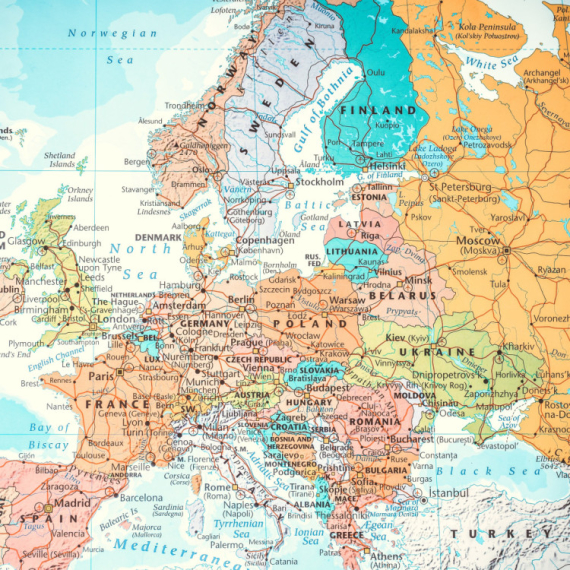Gustav kills nearly 70 in Caribbean, aims at U.S.
Tropical Storm Gustav was blamed on Thursday for at least 68 deaths in the Caribbean.
Friday, 29.08.2008.
10:26

Tropical Storm Gustav was blamed on Thursday for at least 68 deaths in the Caribbean. Meanwhile, U.S. forecasters said it could hit New Orleans and Gulf of Mexico oil fields as a potentially powerful hurricane next week. Gustav kills nearly 70 in Caribbean, aims at U.S. As Gustav churned through the Caribbean, Tropical Storm Hanna formed in the Atlantic Ocean with 40-mph (65-kph) winds. The eighth storm of a busy Atlantic hurricane season was on a track that could threaten the Bahamas and Florida, the U.S. National Hurricane Center said. Energy companies prepared for Gustav to deliver what could be the hardest hit to the heart of the U.S. Gulf oil patch since the devastating 2005 hurricane season. Oil prices rose above $120 a barrel in early trade on Thursday, adding to gains all week, as Gustav aimed deep into the heavy concentration of oil and natural gas platforms off Louisiana and Texas But crude prices fell back more than $2 after the U.S. government and the International Energy Agency pledged to release emergency stockpiles if Gustav disrupts production in an area that provides the United States with a quarter of its crude oil and 15 percent of its natural gas . Gustav was 15 miles west of Kingston, Jamaica, at 8 p.m. EDT (midnight GMT), the hurricane center said. Its top sustained winds were 70 mph (110 kph), just short of the 74-mph (119 kph) hurricane threshold. Forecasters said it could become a hurricane by Friday. New Orleans, the Southern U.S. city ravaged by Hurricane Katrina three years ago, remained near the middle of the range of possible landfall locations on the U.S. Gulf Coast. Louisiana Gov. Bobby Jindal put New Orleans residents on alert for possible evacuations starting on Friday, the third anniversary of Katrina's strike, and issued a precautionary disaster declaration. A state of emergency was declared in neighboring Mississippi, which was also devastated by Katrina. Mounting toll Gustav barged ashore as a hurricane in Haiti on Tuesday and its driving rains took at least 59 lives there and eight in the neighboring Dominican Republic on the island of Hispaniola. Officials said the deaths were due mostly to flooding and mudslides in western and southern Haiti. In Jamaica, shops, post offices and schools shut their doors and authorities ordered nonessential workers to stay home before Gustav made landfall on Thursday afternoon. The storm buffeted the lush, mountainous island with high winds and torrential rains that soaked some sugar cane fields. Rooftops flew off houses in isolated areas and a 50-year-old man fell to his death after a strong gust of wind blew him out of the tree where he was picking breadfruit as the storm closed in on Jamaica's central Manchester parish. Gustav is the first serious Atlantic storm since the 2005 hurricane season to threaten New Orleans and the 4,000 U.S. energy platforms in the Gulf. Katrina and Rita destroyed 124 platforms and severed pipelines when they swept through the Gulf of Mexico as Category 5 storms on the five-step Saffir-Simpson scale of hurricane intensity. Katrina came ashore near New Orleans on August 29, 2005, as a Category 3 hurricane and flooded the city. It killed 1,500 people along the Gulf Coast and caused $80 billion in damage. U.S. Army Corps of Engineers program manager Bill Irwin told a news conference on Thursday that gaps remained in New Orleans' flood control system and that it was still vulnerable despite improvements after Katrina. The agency was rushing to install temporary flood-prevention structures, Irwin said. Energy companies shut down production and pulled workers from Gulf offshore rigs. The Louisiana Offshore Oil Port, the nation's only deepwater oil port, which normally offloads about 1 million barrels of foreign crude per day, expected to stop working over the weekend. On its current path, Gustav will threaten the Cayman Islands and western Cuba before entering the Gulf. Energy traders also warily watched newborn Hanna, 260 miles northeast of the northern Leeward Islands. The storm was moving west-northwest and could become a hurricane by next week.
Gustav kills nearly 70 in Caribbean, aims at U.S.
As Gustav churned through the Caribbean, Tropical Storm Hanna formed in the Atlantic Ocean with 40-mph (65-kph) winds. The eighth storm of a busy Atlantic hurricane season was on a track that could threaten the Bahamas and Florida, the U.S. National Hurricane Center said.Energy companies prepared for Gustav to deliver what could be the hardest hit to the heart of the U.S. Gulf oil patch since the devastating 2005 hurricane season.
Oil prices rose above $120 a barrel in early trade on Thursday, adding to gains all week, as Gustav aimed deep into the heavy concentration of oil and natural gas platforms off Louisiana and Texas
But crude prices fell back more than $2 after the U.S. government and the International Energy Agency pledged to release emergency stockpiles if Gustav disrupts production in an area that provides the United States with a quarter of its crude oil and 15 percent of its natural gas .
Gustav was 15 miles west of Kingston, Jamaica, at 8 p.m. EDT (midnight GMT), the hurricane center said. Its top sustained winds were 70 mph (110 kph), just short of the 74-mph (119 kph) hurricane threshold. Forecasters said it could become a hurricane by Friday.
New Orleans, the Southern U.S. city ravaged by Hurricane Katrina three years ago, remained near the middle of the range of possible landfall locations on the U.S. Gulf Coast.
Louisiana Gov. Bobby Jindal put New Orleans residents on alert for possible evacuations starting on Friday, the third anniversary of Katrina's strike, and issued a precautionary disaster declaration. A state of emergency was declared in neighboring Mississippi, which was also devastated by Katrina.
Mounting toll
Gustav barged ashore as a hurricane in Haiti on Tuesday and its driving rains took at least 59 lives there and eight in the neighboring Dominican Republic on the island of Hispaniola.Officials said the deaths were due mostly to flooding and mudslides in western and southern Haiti.
In Jamaica, shops, post offices and schools shut their doors and authorities ordered nonessential workers to stay home before Gustav made landfall on Thursday afternoon. The storm buffeted the lush, mountainous island with high winds and torrential rains that soaked some sugar cane fields.
Rooftops flew off houses in isolated areas and a 50-year-old man fell to his death after a strong gust of wind blew him out of the tree where he was picking breadfruit as the storm closed in on Jamaica's central Manchester parish.
Gustav is the first serious Atlantic storm since the 2005 hurricane season to threaten New Orleans and the 4,000 U.S. energy platforms in the Gulf.
Katrina and Rita destroyed 124 platforms and severed pipelines when they swept through the Gulf of Mexico as Category 5 storms on the five-step Saffir-Simpson scale of hurricane intensity. Katrina came ashore near New Orleans on August 29, 2005, as a Category 3 hurricane and flooded the city. It killed 1,500 people along the Gulf Coast and caused $80 billion in damage.
U.S. Army Corps of Engineers program manager Bill Irwin told a news conference on Thursday that gaps remained in New Orleans' flood control system and that it was still vulnerable despite improvements after Katrina.
The agency was rushing to install temporary flood-prevention structures, Irwin said.
Energy companies shut down production and pulled workers from Gulf offshore rigs. The Louisiana Offshore Oil Port, the nation's only deepwater oil port, which normally offloads about 1 million barrels of foreign crude per day, expected to stop working over the weekend.
On its current path, Gustav will threaten the Cayman Islands and western Cuba before entering the Gulf.
Energy traders also warily watched newborn Hanna, 260 miles northeast of the northern Leeward Islands. The storm was moving west-northwest and could become a hurricane by next week.


























































Komentari 0